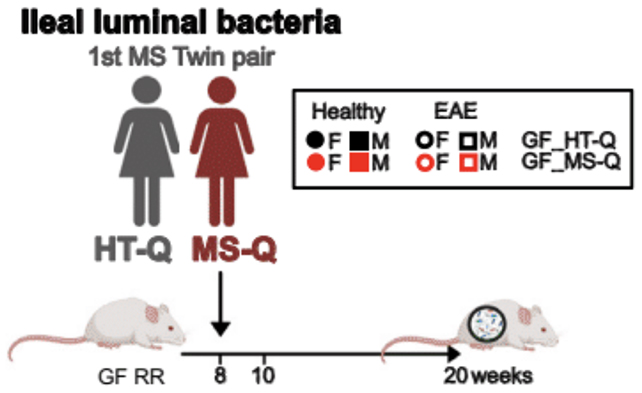Having higher numbers of particular gut microbes might put you at a higher risk of developing multiple sclerosis (MS), a new twin study shows. The finding could lead to new treatments for preventing or halting the progression of the disease.
Researchers led by a team from the Ludwig Maximilian University of Munich were able to identify two specific strains of bacteria more common in people with MS, and associated with the disease developing in mice.
"The likely active organisms were identified as Eisenbergiella tayi and Lachnoclostridium, members of the Lachnospiraceae family," write the researchers in their published paper.

Previous studies have linked gut microbiome changes to MS, but the underlying details and mechanisms aren't clear. Here, the researchers looked at gut bacteria from 81 pairs of identical twins, where one twin has MS and the other doesn't.
That approach meant that many genetic and environmental risk factors were ruled out, narrowing down the reasons why the disease might have developed. A total of 51 different bacteria types weren't consistent in terms of their abundance across the twin pairs.
Next, the team transferred gut microbes from some of the twins over to mice that had been engineered to be susceptible to MS-like disease. A close analysis of the mice that did get ill then revealed the microbes most likely to be responsible.
Referring back to the differences already recorded between the twins gave the researchers even more evidence that E. tayi and Lachnoclostridium were at least partly responsible for MS developing.
"Together with our functional studies, this supports our conclusion that these bacteria might play a crucial role as environmental triggering factors of human multiple sclerosis, although further studies will be required to extend our present findings," write the researchers.
Part of the difficulty in studying MS is that there are so many risk factors involved. We know genetics plays a role, but certain environmental factors are also thought to contribute. Identical twins were chosen for this study to control for those genetic influences, allowing the team to study environmental factors more closely.
When it comes to microbes, one hypothesis suggests that the well-established link between the brain and our guts might go some way to explaining how MS gets started. The disease is characterized by the immune system going awry, attacking nerves in the brain and spinal cord, and that could be in response to signals from elsewhere in the body.
We're still in the early stages here, and there are limitations to the study – not least that a key part of it involved mouse models, rather than people – but further research can now build on what's been found here, and perhaps reveal ways the gut microbiome could be treated to lessen MS risk.
"Our results identify potentially disease-facilitating bacteria sampled from the ileum of multiple sclerosis affected twins," write the researchers.
"The experimental strategy may pave the way to functionally understand the role of gut microbiota in initiation of multiple sclerosis."
The research has been published in PNAS.
